This page is a list of gender-based utopias and dystopias. I will keep it updated with new discoveries as they come to me – suggestions welcome.
The list is arranged in four categories:
female-dominated utopias
female-dominated dystopias
male-dominated utopias
male-dominated dystopias
In an attempt to be even-handed, I am abandoning my usual practice of capitalising ‘Female’ words. Only for this page, mind.
What qualifies for inclusion? Well, in theory anything that meets these two criteria:
(1) it must describe a utopia [dystopia] – an imagined place or time in which some aspect is perfect or approaches perfection [or the opposite], and where the creator invites the audience to share in that value judgement. So, a vision where someone is implicitly saying, look, wouldn’t this be wonderful [dreadful].
(2) the central theme, or one of the central themes, must be the relationship between male and female.
Obviously, (2) excludes most of the great utopias, including Thomas More’s Utopia itself, and the two great dystopias of the last century, 1984 and Brave New World. Perhaps less obviously, (1) means that many fantasies where gender roles are characterised in a particularly strong way do not qualify either. Viscount Ladywood’s Gynecocracy, which I have reviewed elsewhere on this blog, does not appear, because it’s just erotica – we are not being invited to agree that what it describes is a good thing; rather we are expected merely to enjoy it or else to put the book down.
When I decided to put together this list I naively imagined I would find a roughly equal number of examples in each of the four genres. Of course it hasn’t turned out that way; female-dominated utopias outnumber the other categories significantly. This is inevitable, when you think about it. You wouldn’t be reimagining gender in a utopian way at all unless you were looking for something radically different from what you were used to; and what we are used to, for the most part, is patriarchal.
The challenge in producing a male-dominated utopia is, therefore, what is there to say? Considering the two examples I have put in the MDU category below, it looks like the writers really had very little choice but to bang on about sex. After all, a utopia in which men were in political power and controlled the wealth, and women looked nice and did what they were told, would just look like – well, a 1950s novel. Or a Victorian novel. Or a sitcom. John Norman and the Marquis de Sade, in seeking to write about extreme examples of male power over the female, only really have room for manoeuvre in the arena of sexual conduct. Strip away their rights and let us at ‘em. We FDU writers, conversely, can write about pretty much any aspect of society we choose, and show how it could be different.
On the dystopian front, male-dominated dystopias tend to have the character of Cassandra-like prophecy, because they are generally extensions of aspects of the present (The Handmaid’s Tale, or the ‘badlands’ section of The Gate to Women’s Country, though the rest of that book carries it into the FDU category), whereas female-dominated dystopias are a rare and rather bizarre construct designed to do, well, I’m not really sure what. After all, why imagine something that doesn’t exist, only to knock it down again? I know of only one example – Walter Besant’s – but I would be interested to hear about others. However as there is a recent trend towards thinking that society is in thrall to gyneolatry [https://gynocentrism.com/] there may well be some contemporary fiction in this area, though that sort of attitude is probably more likely to generate the uppity-female-gets-her-comeuppance kind of tale (Vanity Fair?) than anything utopian in character.
Katharine Burdekin’s Swastika Night (1937) is perhaps the most interesting (and horrifying) outlier on the list. Male-authored MDUs predictably paint their female protagonists as beautiful; desireable but helpless, whether willingly so (Norman, usually) or not (Sade, usually). Burdekin posits the suggestion that to achieve absolute mastery in the sexual arena men would have to destroy the beauty of women altogether, because beauty is the source of their power. Now that’s a Dystopia.
FEMALE-DOMINATED UTOPIAS
Edward Bulwer Lytton, The Coming Race (1871)
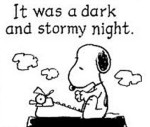 Bulwer Lytton has gone down in history (unfairly) as the creator of the worst opening line of any novel. It is even the subject of an annual competition to find a worse one. I blame Snoopy, who popularised it.
Bulwer Lytton has gone down in history (unfairly) as the creator of the worst opening line of any novel. It is even the subject of an annual competition to find a worse one. I blame Snoopy, who popularised it.
The Coming Race is about an advanced species who live beneath the surface of the Earth, awaiting their chance to rise up and take over.
This is one of those FDUs which justifies male subjugation by making its females physically imposing – see Herland for another example. It seems to me that this does rather miss the point.
“This young Gy [female] was a magnificent specimen of the muscular force to which the females of her country attain. Her features were beautiful, like those of all her race: never in the upper world have I seen a face so grand and so faultless.”
James Lawrence, The Empire of the Nairs (1801)
Lawrence believed the institution of marriage was a disaster for everyone, because humans are incapable of fidelity. The Nair Kingdom is a matriarchy loosely based on contemporary scraps of real information about social arrangements in Kerala (India). Families are matriarchal, with property passing from mothers to their daughters. There is no concept of fatherhood, for a woman simply has a stream of lovers, as she chooses.
“A hundred instruments and a thousand voices announce the appearance of the Samorina. She comes! sovereign princes in her suite, surrounded by ministers of state, attended by the first officers of her household. Among the ladies of the court the Countess of Raldabar shines unrivalled for her elegance and beauty.”
Robert Graves, Seven Days in New Crete (1949)
An example of a common trope: a present-day hero magically transported into a future civilisation. This one has a triple-Goddess religion and its society is essentially matriarchal, if only moderately so. I perhaps wouldn’t have included it at all, except that Graves is such an interesting case. He also penned The White Goddess, a historical grammar of the language of poetic myth, which argued the case for a prehistoric, matriarchal Goddess religion. It was highly influential, if academically suspect.
My Little Pony (ongoing)
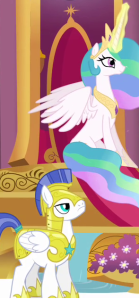
I seriously considered including this. Then I did include it. If you’re not familiar, the MLP universe is populated by females who are sassy, spirited, generally beautiful and sometimes either wise or evil geniuses as the plot demands. The males are handsome, quiet, and stand around guarding things or keeping the story bowling along as needed. They behave themselves, and a lot of them wear uniforms while they listen to the females talk and wait to be told what to do. Either that, or they’re cute pets.
I’ve put MLP in the list as a marker for that cultural current of GirlPower-inspired you can be anything you want to be type of thinking.
Hoof rub, anyone?
Joanna Russ, The Female Man (1970)
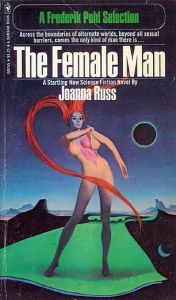 There are people who will read this book and say, the sci-fi is all very well, good actually, for a woman, but there’s all that feminist bile to plough through. If only that weren’t there, it might be worth reading.
There are people who will read this book and say, the sci-fi is all very well, good actually, for a woman, but there’s all that feminist bile to plough through. If only that weren’t there, it might be worth reading.
Well, you have my approval if you choose to flick such a person by the ears or drop the pointy end of his tie into his drink. This sort of complaint is usually the fault of the cover design, not the author. It was not what I thought it was.
It’s true enough there is plenty of feminist rant in this book, but bile is unfair, because a lot of it is very funny, especially the portrayal of men. Witness:
‘You’re a woman,’ he cries, shutting his eyes, ‘you’re a beautiful woman. You’ve got a hole down there. You’re a beautiful woman. You’ve got real, round tits and you’ve got a beautiful ass. You want me. It doesn’t matter what you say. You’re a woman, aren’t you? This is the crown of your life. This is what God made you for. I’m going to fuck you. I’m going to screw you until you can’t stand up. You want it. You want to be mastered. Natalie wants to be mastered. All you women, you’re all women, you’re sirens, you’re beautiful, you’re waiting for me, waiting for a man, waiting for me to stick it in, waiting for me, me, me.’
Et patati et patata; the mode is a wee bit over-familiar.
I told him to open his eyes, that I didn’t want to kill him with his eyes shut, for God’s sake. He didn’t hear me.
‘OPEN YOUR EYES!’ I roared, ‘before I kill you!’ and Boss-man did.
He said, You led me on.
He said, You are a prude. (He was shocked.)
He said, You deceived me.
He said, You are a Bad Lady.
(Reader, she kills him).
There is also a lovely twist at the end, which any review other than this one will give away in its first paragraph. Don’t read those reviews.
The utopian part of Russ’s novel is a place called Whileaway, which is one of several alternative worlds described in parallel. It barely qualifies to be here, because it has no men. But there are men elsewhere in the book, so let that pass. Here it is:
There’s no being out too late in Whileaway, or up too early, or in the wrong part of town, or unescorted. You cannot fall out of the kinship web and become sexual prey for strangers, for there is no prey and there are no strangers –the web is world-wide. In all of Whileaway there is no one who can keep you from going where you please (though you may risk your life, if that sort of thing appeals to you), no one who will follow you and try to embarrass you by whispering obscenities in your ear, no one who will attempt to rape you, no one who will warn you of the dangers of the street, no one who will stand on street corners, hot-eyed and vicious, jingling loose change in his pants pocket, bitterly bitterly sure that you’re a cheap floozy, hot and wild, who likes it, who can’t say no, who’s making a mint off it, who inspires him with nothing but disgust, and who wants to drive him crazy.
I could however just as well have put this book in the MDD section, because another alternative universe is populated by men, some of whom are surgically modified into parodies of real women at an early age in order to provide an outlet for the baser instincts.
If you read one book on this list, read The Handmaid’s Tale. But if you read two, read The Female Man.
Elizabeth Burgoyne Corbett, New Amazonia (1889)
Corbett was an active campaigner for women’s suffrage, and New Amazonia is her vision of a feminist future, set in Ireland.
As with so many utopias, a visitor from the present is transported there in unlikely circumstances. Our Victorian heroine falls asleep, indeed, reading a magazine in which other women are commenting on the evils of women’s suffrage. So riled is she by this that she is magically transported from 1889 to the year 2472. And Utopian in most certainly is:
[I awoke] in a glorious garden, gay with brilliant hued flowers, the fragrance of which filled the air with a subtle and delicate perfume; around me were trees laden with luscious fruits which I can only compare to apples, pears, and quinces, only they were as much finer than the fruits I had hitherto been familiar with as Ribstone pippins are to crabs, and as jargonelles are to greenbacks. Countless birds were singing overhead…
Within moments she has encountered her first local, a woman ‘close upon seven feet in height, I am sure, and of magnificent build. A magnified Venus, a glorified Hebe, a smiling Juno, were here all united in one perfect human being whose gait was the very poetry of motion.’
So far, so predictable. But does this turn out to be a liberal paradise? Not at all! Corbett is surprisingly reactionary for someone so embittered by male oppression. The poorer women are barred from entry; unhealthy infants are killed; and the inhabitants’ primary concern is how to keep themselves young. I can’t help regretting Ms Corbett didn’t set her sights a little higher.
“I was told that the primary purpose of this building was to afford facilities for inoculating the aged or debilitated with the nerves of young and vigorous animals, and that this was the explanation of the fact that I had as yet seen no really old-looking people in the New Amazonia.”
New Amazonia can be downloaded here.
Elizabeth Wolstenholme, Woman Free (1893)
So here’s the thesis: menstruation is not natural, but an inherited disease borne out of centuries of rape in prehistory. In the future, science will free woman of this disease and enable her to reach her full potential. It’s a 32-page poem, followed by 200 pages of notes supplying Wolestenholme’s evidence.
For carnal servitude left cruel stain
And galls that fester from the fleshly chain
Unhealed the scars of man’s distempered greed
The wounds of blind injustice still they bleed;
Recurrent suffering lets her not forget
The aimless payments of a dismal debt –
Survival from dim age of man’s abuse
Of functions immature, profaned by savage use.
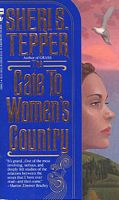 Sherri Tepper, The Gate to Women’s Country (1988)
Sherri Tepper, The Gate to Women’s Country (1988)
I have reviewed this book elsewhere on the blog. It is set in a post-apocalyptic matriarchal future, but is juxtaposed with alternative male-dominated structures that lie outside the walls of feminist civilisation. Interestingly, the men get to choose where to live. And there’s an absolutely beautiful ‘reveal’ right at the end.
Charlotte Perkins Gilman, Herland (1915)
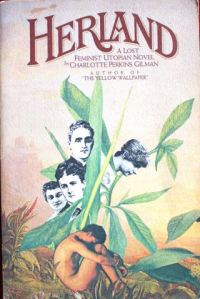 Who wouldn’t feel like rejecting patriarchy in 1915? Herland is a remote region of the earth, cut off by geographical accident. The men all died off centuries ago, and the women have managed to find a way to reproduce without them. They have also taken on certain masculine characteristics. Then a trio of chaps accidentally discover Herland in a biplane, and in the usual way are taken captive and shown around. One of them rather likes it all; the others not so much.
Who wouldn’t feel like rejecting patriarchy in 1915? Herland is a remote region of the earth, cut off by geographical accident. The men all died off centuries ago, and the women have managed to find a way to reproduce without them. They have also taken on certain masculine characteristics. Then a trio of chaps accidentally discover Herland in a biplane, and in the usual way are taken captive and shown around. One of them rather likes it all; the others not so much.
Originally published in serial form, Herland did not appear as a book until 1979.
“They were girls, of course, no boys could ever have shown that sparkling beauty, and yet none of us was certain at first. We saw short hair, hatless, loose, and shining; a suit of some light firm stuff, the closest of tunics and kneebreeches, met by trim gaiters. As bright and smooth as parrots and as unaware of danger, they swung there before us, wholly at ease, staring as we stared, till first one, and then all of them burst into peals of delighted laughter.”
Margaret Piercy, Woman on the Edge of Time (1979)
This one almost doesn’t count, because gender as we know it is on the verge of being broken down. Woman on the Edge of Time brings together the common themes of sexual equality, ecological responsibility, anarchy, and – almost but not quite – no more men.
“It was part of women’s long revolution. When we were breaking all the old hierarchies. Finally there was that one thing we had to give up too, the only power we ever had, in return for no more power for anyone. The original production: the power to give birth. Cause as long as we were biologically enchained, we’d never be equal. And males never would be humanized to be loving and tender. So we all became mothers. Every child has three. To break the nuclear bonding.”
FEMALE-DOMINATED DYSTOPIAS
The interesting thing about this category is how scarce the examples are.
Walter Besant, The Revolt of Man (1882)
I have reviewed this book elsewhere on this blog. You could argue that it is really an example of male-dominated utopia, because the book ends with everyone admitting how silly they’ve been and how they’d really much rather go back to the old ways. Interestingly, I’ve discovered that Besant’s brother was married to the Victorian advocate of birth-control, Annie Besant. You have to wonder how they got on.
“We took from men their education, and science has been forgotten. we cannot now read the old books; we do not understand the old discoveries; we cannot use the tools which they invented, the men of old. Mathematics, chemistry, physical science, geology – all these exist no longer, or else exist in such an elementary form as our ancestors would have been ashamed to acknowledge… Women, who can receive, cannot create; because at no time has any woman enriched the world with a new idea…”
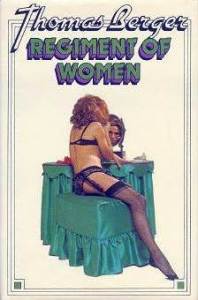 Thomas Berger, Regiment of Women (1973)
Thomas Berger, Regiment of Women (1973)
“The dentist’s drill of the alarm probed viciously into the diseased pulp of his dream, and Georgie Cornell awakened. His baby-doll nightgown was up to his sternum, exposing both his pudenda—he never wore the ruffled panties, which chafed—and his thrusting breasts. His member would remain tumid until he tinkled. He staggered to the bathroom in his bunny slippers and did his business.”
That’s the first sentence. Welcome to the world of Regiment of Women.
Here’s our hero studying his therapist, a few pages later (right before she rapes him):
“His eyes rose along the knife-edge crease of her right trouserleg and verged over onto the flat fly when at the appropriate elevation. On up across the vest, with the heavy gold chain and Phi Beta Kappa key, to the striped tie, the stiff white collar fringed by the lower margin of the self-adhesive nylon beard, pepper-and-salt, neat. The mustache, he thought, was her own, black and sparse.”
“Don’t worry,” she reassures him a little later, “you’re still a little way from castration.”
So here’s the thing; role reversal only works if you don’t reverse everything. Here it is so complete that its not really a Gynarchy at all; it’s a parody of a Benny Hill sketch with the pronouns switched. Entertaining, though.
MALE-DOMINATED UTOPIAS
The general idea here is: if only that pesky idea of civilization didn’t get in the way, we’d be able to do what we like. Because it comes naturally. And, you know, the chicks would probably like it too. Secretly. At least, if they’re real chicks. And if they’re not, they need to learn to be.
This seems the appropriate place to ask, when does a utopia become a dystopia? As usual, the answer is when the author wants it to. Remember, that’s part of my definition. Sade comes under utopia because if he wasn’t simply pulsating with the delight of it all, it wouldn’t be the same work.
John Norman, Gor (1966-present)
Gor (35 novels or thereabouts) can stand here for the whole fantasy subgenre of which it is the longest (so long) and most visible example (if you hang around in second-hand book stores, anyway), although Carrie Fisher’s 1983 gold bikini moment has become a more iconic vision of this sort of thing than anything Norman conjured up.
I am not a John Norman fan, but then I wouldn’t be, would I. I have realised in putting together this list however that he does at least want women to enjoy themselves (at least in the bits I’ve read). That’s something, I suppose, compared with what some female writers have conjured up (below).
Gor is definitely not commercially available and you should under no circumstances try to buy it, because Mr Norman will surely spend the proceeds on bad things. You always have to consider that side of things. As Joanna Rowling recently said to a customer who vowed to burn his Harry Potter DVDs in response to one of Rowling’s attacks on Trump, I’ve already got your money. Be my guest.
Marquis de Sade, Justine (1791)
Was de Sade a utopianist? I think he must be, because he wasn’t just telling stories, he was propounding his philosophy of absolute egotism and self-gratification. He was also living the dream, and spent time in prison (including the Bastille) for stripping, flogging and sodomising women. “Were nature offended by these proclivities,” he wrote, “she would not have inspired them in us.”
“If then it becomes incontestable that we have received from Nature the right indiscriminately to express our wishes to all women, it likewise becomes incontestable that we have the right to compel their submission, not exclusively, for I should then be contradicting myself, but temporarily. It cannot be denied that we have the right to decree laws that compel woman to yield to the flames of him who would have her; violence itself being one of that right’s effects, we can employ it lawfully. Indeed! has Nature not proven that we have that right, by bestowing upon us the strength needed to bend women to our will?”
MALE-DOMINATED DYSTOPIAS
Suzy McKee Charnas, Walk to the End of the World (1974)
One of those awkward cases that flips from one category to another, but the bulk of the narrative certainly belongs here. The book is set in the distant future after an undescribed ecological collapse for which women have somehow taken the blame. It’s Eve and the apple all over again. They are not having a good time of it:
“The moon was up, brightening the beach. Rows of small clay lamps dotted the sand. A few were still alight among the crouching forms of fems who were wringing moisture from the lammins with cord-nets. Young men walked in pairs among them, carrying switches with splayed ends. Occasional snapping sounds, followed by yelps, punctuated the plaintive, blurry singing of the fems. The young men wore their hoods up, being nervous about the moon, which was the mistress of all fems and of the evil in them. Old men outgrew such timidity.”
From the blurb:
“In the world after the Wasting, humanity survives in isolated feudal strongholds, scratching a meagre living among Earth’s ruins. One such community, the grim Holdfast, has evolved a mythology blaming women for the cataclysm. Locked in the Wellesian underworld of docks, furnaces and food factories, the women are held captive as breeding animals and slaves.”
“From the horrors of Holdfast, one stubborn woman, Alldera, sets out to find the legendary ‘Free Fems’ in the scorched plains beyond the Wild…”
Does Alldera find the Free Fems? You betcha! If you’re more comfortable with that, get hold of Volume Two, Motherlines, which would no doubt appear in my FDU list except that I haven’t got round to reading it yet.
Margaret Atwood, The Handmaid’s Tale (1985)

The Handmaid’s Tale is set in the USA in the near future, after an extreme Christian sect seizes power. It focuses on a class of women – the eponymous handmaids – who are unusual in having preserved their sexual fertility through the storm of pollution and disease that is the human future. Their reward is to be kept as the property of individual, powerful men.
Handmaid’s Tale is also a film, a TV series, and an opera by Poul Ruders. It is also, IMHO, the best book in this list.
 Katharine Burdekin, Swastika Night (1937)
Katharine Burdekin, Swastika Night (1937)
Swastika Night is set in the 26th century after a Nazi victory in the 20th. Hitler is a god. Women are categorised as animals, and are kept in cages for the purpose of reproduction. This is about as dystopian as it gets.
“Women will always be exactly as men want them to be. They have no will, no character, and no souls…Once they were convinced that men really wanted them to be animals and ugly and completely submissive and give up their boy children for ever at the age of one year, they threw themselves into the new pattern with a conscious enthusiasm that knew no bounds. They shaved their heads till they bled, they rejoiced in their hideous uniforms as a young Knight might rejoice in his Robe of Ceremony, they pulled out their front teeth until they were forbidden for reasons of health, and they gave up their baby sons with the same heroism with which they had been used to giving their grown sons to the war.”
There we are. What have I missed?


Star Trek the 60’s version. A male Utopia in which a kindly benificent male dominated Federation look to explore and change the universe around them. Going against the Prime Directive in every episode.
LikeLike
But was the relationship between the sexes one of the main themes?
LikeLike
Regiment of Women. (Was it by Pynchon? If not there is another and another by him, the name of which I’ve forgotten. I’ll cast about among my books and will send the name along when I find even if to exclude it from your category. The Piercy work is of interest to me, because I have been writing biologically about self-dual hypergraphs, which breed, preserving self-duality, only in triples .
LikeLiked by 1 person
Do you mean this: https://www.goodreads.com/book/show/296711.Regiment_of_Women ? i’d never heard of it, but thank you i will check it out.
LikeLike
I thought I’d never find the book, but in fact it came almost immediately to hand. It’s not by Pynchon, but by Thomas Berger (1973). The title (Regiment of Women) is taken from a tract by John Knox 1558 against the promotion of what he called “the monstrous regiment of women” to positions of authority. Berger’s novel is set in New York of 2047. There is another book, the title of which I have now forgotten, from around the same period by neither of those two authors and on a related theme. There is probably an extensive school of books and online stories swimming about that might or might not fetch up in your net. I have ordered the Wolstenholme from India for a planned comparison of philosophical papers with menstruation (aimless payments etc.) I know Congleton and Manchester fairly well because my daughter lived near the former and works in the latter. When next I’m there I’ll poke about in the uni library.
If the other book turns up, I’ll let you know.
Kind regards,
Ray
LikeLike
Thank you – read it and added to the list
LikeLike